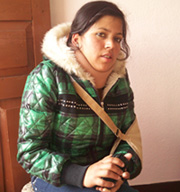Tika Bista heard the word “journalist” for the first time while she was still at school in Rukum, in western Nepal. She saw journalists from Kathmandu taking pictures on their way to the village. It was love at first sight. She entered the world of journalism and began her career five years ago. Then last month, the love affair became severely corrupted: Somebody attempted to murder her.
Until December 8, 2009, Bista, 22, was not a well-known name in the Nepalese media, though she was a prolific writer. Her life-threatening incident expanded her reputation across the global media community. It is a pity that a journalist of her caliber has to be known for a deadly attack rather than for her work.
Bista, a reporter for the Kathmandu-based Rajdhani daily, was mercilessly slashed with razor blades by masked individuals before being thrown into the forest in a far-flung district of Nepal, she said. She was airlifted to Kathmandu for treatment after journalists and police found her unconscious. Her condition was critical. She had blood clots in her skull and injuries in her spine, her left shoulder, the fingers of her right hand, and in her left foot. She has recovered well, but still needs a couple of months for a complete recovery. The doctors have suggested she undergo physiotherapy sessions and psychological counseling.
Bista was attacked for an article she wrote for Jantidhara, a local newspaper in Musikot of Rukim. She wrote in defense of Tirtha Gautam, a Constituent Assembly (CA) member from her town.
On October 27, 2009, Minister for Information and Communication Shankar Pokhrel visited Rukum to inaugurate an FM radio station. Cadres of the largest party in the legislative parliament, the Unified Communist Party of Nepal (Maoist), showed a black flag to the minister as a part of a protest against the government—a black flag is a common symbol of protest in Nepal. Gautam was accompanying the minister when the Maoists accused her of having illicit relations with the minister. Yadu, Gautam’s husband, was murdered by the Maoists while he was a candidate for the 1999 general election. Gautam won the election as his widow.
Bista wrote an article about the allegation with title: “Why do the Maoists need Tirtha’s Sindoor?” Sindoor is the vermillion powder married women wear on their foreheads. Widows do not wear the mark. In her article defending Gautam, Bista also raised spoke against the Maoists’ bloody politics and pleaded for a peaceful resolution.
After article’s publication, Bista started getting threats from unknown numbers. “Why you need to bother about Tirtha’s sindoor?” she recalled the voice saying. “Aren’t you bothered about your own sindoor?”
Bista is unmarried and lives with her mother, brother, and sister-in-law. She is also a college student, studying education. The day of the attack, she was told in an anonymous phone call that her sister-in-law had been admitted to the hospital. She rushed to the hospital, but she was attacked on her way.
Since the hospital discharged her, she has been taking shelter at various houses in Kathmandu. She briefly lived with a journalist and then in apartment rented by CA member Tirtha Gautam. I met her in that apartment, where she was trying to warm herself with the winter sun peeping through the window.
Now she is healing but the Maoists have started playing dirty politics, which, she told me, hurts her more. On December 27, CA members Lokendra Bista Magar, representing the Maoists, claimed that Bista had attempted suicide. An investigation commission formed by the Maoists reported the same conclusion.
“I am strong enough to carry on with my job,” she told me. “I feel more bound to my duty as there are expectations for more work from me, But I worry how people are going to take such false claims.”
The government is sympathetic to Bista. Prime Minister Madhav Kumar Nepal and various ministers and politicians have visited her and made commitments to punish the culprits. (When I visited her in the hospital, Defense Minister Bidya Devi Bhandari came to see her.) On December 24, 2009, the government decided in a cabinet meeting to give Bista 300,000 Nepalese rupees (approximately US$4,200). She recently told me she has not yet received that money.
The attack rang an alarm bell to the entire world that Nepal is not safe for journalists, despite the country’s achievement of democracy. The constitution guarantees press freedom as a fundamental right. However, political parties still use barbaric methods to counter journalists.
An investigation by the Federation of Nepali Journalists indicated that Maoists were behind the attack. Recently, Information and Communications Minister Shankar Pokhrel said that the attack on Bista was not criminal, adding that when a powerful political party is involved, the state is incapable of doing anything. The federation said that local police can easily arrest the culprits if the political parties are supportive.
Despite all this, Bista has kept her morale high. “The attack and aftermath have given me more responsibility,” she told me. She said her new life would be that of a crusader’s for a free press. “I have not committed any mistake, so the journalistic fraternity is with me. I have won this war!”
Guna Raj Luitel is an associate editor for the daily Nagarik in Nepal. He’s been based in Kathmandu as journalist for more than two decades.
